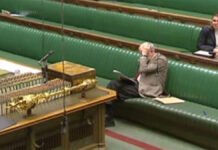The unfairness of any cuts at this time can only be measured against the handouts to Tory friends and the blatant criminal cronyism that is rife within this corrupt government.
Those already hard hit will be hit even harder.
It’s no secret that Britain’s most vulnerable are suffering under the Conservative’s tough program of austerity covid as never offed a reprieve. There has never been a covid relief payment for the poor, in or out of work, food banks are still the lifeline for millions living on the breadline.
Long standing Cuts to local authority services, have had a profound impact on communities, and it is the poorest of communities which are being hit the hardest. “welfare reform and austerity measure are blighting the lives of disadvantaged and breaching their human rights.” Poverty and the struggles of those on the breadline have not disappeared out of the back door as covid came in through the front, to the contrary, the struggle for thousands of people in receipt of universal credit as become even harder.
The poor have been disproportionately affected, changes to benefit systems and cuts driven by austerity have amounted to “discrimination against women, disabled people and ethnic minorities.
The idea that this virus is a ‘great leveller’ has never heald water. The consequences of the virus are not the same for everyone, and disproportionately impact people on low incomes and who are already living in poverty.
Covid, as provided a new round of corporate welfare with handouts of billions to Tory related companies without scrutiny. Cronyism is spreading faster than the virus under the cover of emergency provisions that allow procurement rules to be bypassed.
The Top is Greedy

The more the Tories’ cronyism is indulged, the more their sense of entitlement grows and the more people accept it as the norm.
The figures are staggering. So far, it is estimated that the government, without a transparent tendering process, handed out £18bn in coronavirus-related contracts during the first six months of the pandemic alone. Of this, £1.5bn can be traced to companies or individuals with connections to the Conservative party.
Within those billions there is more shocking detail. A spider’s web of unqualified Tory donors, university friends, neighbours and local pub owners has been entrusted with everything from the provision of PPE to the manufacturing of medical equipment. The tendering process seems to have been jettisoned for random phone calls and texts from opportunists, with ministers too lazy to go through due process and too arrogant to care.
Dan Carden Labour MP hit the point in a tweet saying:
“The whole thing stinks. This Government’s incompetence, its cronyism, its ideological obsession with outsourcing and rip-off privatisation has undermined our NHS and put lives at risk. Time to kick the profiteers out of the system and put local public health teams in charge.”
The whole thing stinks.
— Dan Carden MP (@DanCardenMP) October 14, 2020
This Government’s incompetence, its cronyism, its ideological obsession with outsourcing and rip-off privatisation has undermined our NHS and put lives at risk.
Time to kick the profiteers out of the system and put local public health teams in charge. pic.twitter.com/ivqRy4WgOe
Now we see the other side of the seesaw: Universal Credit payments will be cut for tens of thousands of people this Christmas.
Thousands of households are coming to the end of the so-called benefit cap grace period – and as many as 160,000 households could be affected.
Universal Credit is designed to help households who are either on a low income or are out of work entirely, and therefore the financial support is particularly important. Indeed, throughout the ongoing COVID-19 crisis, many turned to Universal Credit for help, after facing challenging circumstances. But as the country draws closer to Christmas, thousands of households are also coming to the end of their benefit cap grace period.
The benefit cap is a limit to the total amount of money working age people can get from benefits, Citizens Advice says – and is designed to encourage people into work.
It only applies if you get Housing Benefit or Universal Credit, and your benefits will be capped if you get more than the limit that applies for your circumstances.
Seema Malhotra, Labour and Co-operative Party MP for Feltham and Heston, asked: “Some 85 per cent of capped households have families with children, and the minister revealed last week that more than 160,000 households on Universal Credit could see their benefits capped in December, when their grace period comes to an end.
“Does she feel no shame in plunging families and children into hardship right before Christmas?
“Children are paying the price for their parents losing their jobs.
“This is a ticking time bomb and she can stop it – it is her choice: will she scrap the cap?”
Work and Pensions Secretary, Therese Coffey, replied: “The cap has been in an important part of policy in trying to stimulate entrance into work.
“I am conscious that there are still only about half a million vacancies, compared with a significant number of people unemployed.
“However, I am sure the Honourable Lady will welcome, with me, some of the actions possible for some of the most disadvantaged families.
“This is particularly those supported by the £170 million COVID winter grant, from which I understand her local council will benefit to the tune of about £823,000.”
The grace period comes into effect when a claimant’s earnings from work are less than the threshold (between £569 and £604), but immediately before this, their earnings were at least at the threshold for the previous year.
However, it can also occur in a situation where before entitlement to Universal Credit began, the claimant stopped work, yet before doing so, their earnings were at or above the threshold every month for the preceding 12-month period.
Speaking in the Commons, Stephen Timms, Labour MP for East Ham, said: “The number of households affected by the cap has more than doubled since the start of the pandemic, to 170,000.
“In addition, 160,000 households will come to the end of their nine-month benefit cap grace period in the coming month.
“So, will the Secretary of State consider extending the grace period, to avoid cutting the benefits of hard-pressed families in the run-up to Christmas?”
Mrs Coffey said: “The statistics indicate that 140,000 households with children have their benefits capped.
“My understanding is that overall it is about 3.1 percent of the Universal Credit case load.”
The Government says benefits usually go down at the end of the grace period.
However, in certain instances, this may not be the case.
This can happen if circumstances change, while certain benefits are not affected by the cap.
How does the grace period work?
The Government says people will get the grace period if all of the following are true:
- you are claiming Universal Credit because you stopped working or your earnings went down
- you are now earning less than £604 a month
- in each of the 12 months before your earnings went down or you stopped working, you earned the same as or more than the earnings threshold (this was £569 up to March 31, 2020 and is £604 from April 1, 2020)
Your partner’s earnings will be included when working out how much you earned. This is the case even if they are not claiming benefits.
In a situation where you have separated from your partner, their earnings will be included for the time that you lived with them before you split up.
But be aware – you need to report your last 12 months’ earnings when you apply for Universal Credit to get the grace period.
In addition, you will not be affected by the benefit cap if you or your partner get Universal Credit because you have a disability or health condition, or because you care for someone with a disability, or you earn £604 or more between you.
For full details, visit the Government website here.
Help Us Sustain Ad-Free Journalism
Sorry, I Need To Put Out the Begging Bowl
Independent Journalism Needs You
Our unwavering dedication is to provide you with unbiased news, diverse perspectives, and insightful opinions. We're on a mission to ensure that those in positions of power are held accountable for their actions, but we can't do it alone. Labour Heartlands is primarily funded by me, Paul Knaggs, and by the generous contributions of readers like you. Your donations keep us going and help us uphold the principles of independent journalism. Join us in our quest for truth, transparency, and accountability – donate today and be a part of our mission!
Like everyone else, we're facing challenges, and we need your help to stay online and continue providing crucial journalism. Every contribution, no matter how small, goes a long way in helping us thrive. By becoming one of our donors, you become a vital part of our mission to uncover the truth and uphold the values of democracy.
While we maintain our independence from political affiliations, we stand united against corruption, injustice, and the erosion of free speech, truth, and democracy. We believe in the power of accurate information in a democracy, and we consider facts non-negotiable.
Your support, no matter the amount, can make a significant impact. Together, we can make a difference and continue our journey toward a more informed and just society.
Thank you for supporting Labour Heartlands












